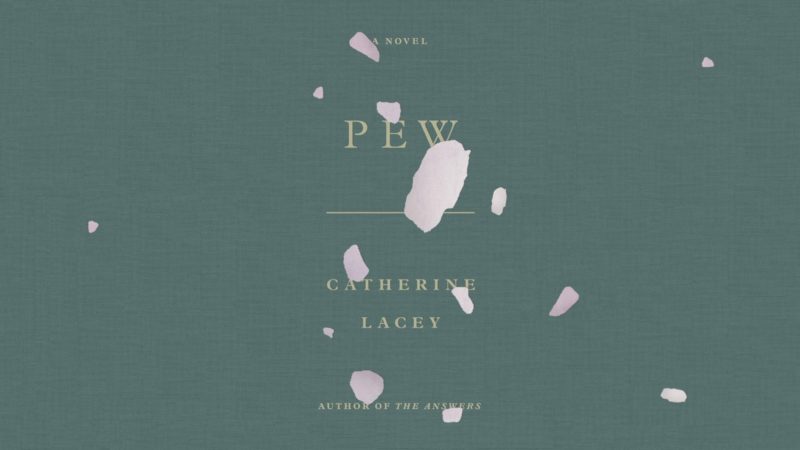Discovered sleeping in a church and promptly nicknamed after the place they are found, Pew, the narrator and namesake of Catherine Lacey’s new novel, is difficult to classify: androgynous and ethnically ambiguous, itinerant, and without memory of either past or origin. They appear darker or lighter, older or younger, depending on who’s looking. Assumed to be a traumatized adolescent, Pew is taken in by a God-fearing family of four, keen to exercise their Christian duty. The problems of the book begin in the face of Pew’s inability or unwillingness to answer the question: “What are you?” To themselves, they are just a person like any other, “ruined by what I have and have not done.”
To further complicate (or simplify) things, Pew refuses to speak to anyone, and the book is structured largely around monologues from their various handlers–an art therapist, the children’s minister, one-eyed old Mrs. Gladstone, and Hilda, the obliging mother who wishes both to protect a child in need and oust any potential threat to her own. Many of these monologues become confessions of one kind or another, to crimes or unaired convictions. Over the seven days of the book’s duration, as the town’s annual “Forgiveness Festival” draws near, it emerges that crimes both large and small have been, and continue to be, committed by the churchgoing community. The town, “not so terrible, but not so nice either,” according to one resident, has a history of lynching and remains deeply segregated. Like the subject of how Mrs. Gladstone lost her eye (ask her husband), this is something people would rather not talk about. Silence becomes complicity, and faith in absolution gives license to harm. In part, Pew examines how the crimes of the individual and the crimes of a society, past and present, intersect, or obscure each other. Pew, Lacey explained in a telephone interview, is a kind of void, “a body in need or in an absence of context” that forces the town’s residents “to confront their positions in their society.”
Part of what the national conversation about racism reveals is how the ideological underpinnings of this country (individualism, meritocracy, the good/bad binary of Christian morality) discourage us from grappling with our history in a way that invites meaningful change. This is masterfully at work in Pew. The “Forgiveness Festival” is explained as a way for the townspeople to “actively reconcile with our past and unite both sides of our community,” but only one side of the town–the white one–participates in the exonerating ceremony, which is safeguarded by police in white uniforms (“the guns are symbolic”).
From the start, the residents maintain their belief in fairness and equality (“everyone gets the same kind of respect”). They find it regrettable that the past has not always lived up to that ideal, but, as one resident notes, “we’ve always been fair to people according to what the definition of fair was at the time.” The townspeople insist that they need to “know what kind of a person” Pew is only in order to “know how to help” them. But there are definitions of fair and orders of help; a different kind might be due if Pew is a white girl of twelve or a Black boy of fifteen.
In Lacey’s formulation, belief itself is suspect, especially where it precludes an examination of actions and their effects. A belief in forgiveness may lead to forgetting; a belief in law and order to oppression. Religion, particularly of the small-town variety Lacey grew up around as a child, is suspect above all. As one rare skeptic tells Pew, it sometimes seems that all “a belief in divinity makes possible in this world is a right toward cruelty.” People need “a sense of righteousness to take things from others.”
If Pew is a criticism of religion in its social and institutional forms, it is also a fairly religious book. Pew is a kind of Christ figure, a unity of indistinction that asks what happens if we break down all divisions, if we take equality to its extreme and become, as Johnny, a young man undone by this ideal, suggests, “nothing.” These ideas have a long history in the part of the Christian tradition that is agnostic about God, such as the mystical atheism of Meister Eckhart or Jakob Böhme. When Pew, after narrowly escaping a forced medical examination, wishes that everyone knew how to speak “the way an insect does… just that one word, no language at all,” they echo Eckhart’s appeal: “Let us pray to God that we may be free of ‘God,’ that we may apprehend… that everlasting truth in which the highest angel and the fly and the soul are equal.”
Likewise, Pew is both a social novel, dramatizing prejudice and the need to control, and a psychological one, concerned with the construction of the self. The book implicates the one in the other. Pew shows how the collective psyche of a society identifies and orders our bodies, and in so doing limits our knowledge of ourselves. Lacey is interested in asking questions beyond those limits.
Pew wonders if it isn’t possible to “know something truer about (the body) from inside,” something that is “masked by the body itself.” The very idea is both a threat and an opportunity, like any serious invitation to change. As Lacey has said in her own writing for Guernica, the problems of the South—social stasis and a history of intolerance—are American issues. Often, what looks like change is the adaptation and disguise of old models with similar outcomes. Pew urges us to see past appearances. People intent on “doing good” often do great harm. “Respect” for difference can keep inequity in place. Like one of the characters in Pew, it is possible to be “kind, kind to everyone,” and “go along with lots of things.”

